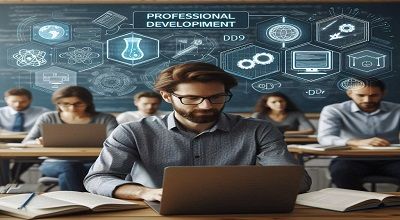Professional Development
Professional development refers to the process of improving and expanding one’s skills. Knowledge, and abilities in a specific field or profession. It is a deliberate and ongoing effort to enhance one’s expertise. Stay current with industry trends, and grow as a professional. PD can take many forms, including formal education, training programs, workshops, conferences, networking, mentoring, and self-directed learning.
Here’s an example to illustrate PD:
- Example: Sarah is a marketing manager at a tech company. She wants to advance her career and stay competitive in the rapidly changing field of digital marketing. To achieve this, she engages in various professional development activities:
- Online Courses: Sarah enrolled in online courses related to digital marketing. Such as search engine optimization (SEO), social media advertising, and data analytics. She completes these courses to acquire new skills and knowledge.
- Industry Conferences: Sarah attends annual digital marketing conferences where she can learn about the latest trends and best practices. She also networks with industry experts to gain insights and build professional relationships.
- Webinars and Workshops: She regularly participates in webinars and workshops hosted by industry leaders and organizations. These events provide her with up-to-date information and practical tips.
- Reading Industry Publications: Sarah subscribes to marketing journals and blogs. And newsletters to stay informed about the latest industry news, research, and case studies.
- Mentoring: She seeks out a mentor who is a seasoned marketing professional to provide guidance. And advice as she navigates her career path.
- Skill Application: Sarah applies the knowledge and skills she gains from her professional development activities to her daily work. For instance, she implements new digital marketing strategies. And tracks their effectiveness using data analytics.
- Feedback and Evaluation: She regularly assesses her progress and seeks feedback from peers and supervisors to identify areas for improvement.
Over time, Sarah’s commitment to PD helped her become a more skilled and knowledgeable marketing manager. This not only benefits her career but also contributes to the success of her company. She helps drive innovative marketing strategies and achieve better results.
What is professional development in education?
Professional development in education refers to the ongoing process by which educators. Teachers, administrators, and other school staff. Enhance their knowledge, skills, and abilities to improve their effectiveness in the classroom and school environment. It is a crucial aspect of the education system, as it ensures that educators stay current with best practices. Pedagogical approaches, and educational research to better meet the needs of their students. Here are some key aspects of professional development in education:
- Lifelong Learning: Professional development in education recognizes that learning doesn’t stop with initial teacher training or certification. Educators are expected to engage in continuous learning throughout their careers to adapt to evolving educational practices and research.
- Improved Teaching Practices: Educators participate in professional development activities to learn about innovative teaching methods. Classroom management techniques, and curriculum design. This knowledge helps them become more effective educators and positively impact student learning outcomes.
- Curriculum Development: Teachers often engage in PD to develop. Or refine curriculum materials, aligning them with state standards and educational goals.
- Technology Integration: As technology becomes increasingly important in education. Professional development helps educators learn how to effectively integrate technology into their teaching, promoting digital literacy and enhancing learning experiences.
- Specialized Training: Some educators pursue specialized professional development to address the unique needs of specific student populations. Such as students with disabilities or English language learners.
More Read…
- Leadership Skills: Professional development in education. Also includes opportunities for educators to develop leadership skills. Preparing them for roles as department heads, instructional coaches, or school administrators.
- Research and Data Analysis: Educators learn to interpret educational research and use data-driven decisions. Making techniques to improve instruction and student achievement.
- Collaboration and Networking: Many PD activities encourage educators to collaborate with colleagues, share best practices, and build professional networks. This collaboration can lead to a richer and more supportive educational environment.
- Certification and Licensing Requirements: In some cases, professional development is necessary to maintain teaching certifications and licenses. Educators may be required to accumulate a certain number of professional development hours or credits to renew their credentials.
- In-Service Workshops and Training: Schools and school districts often provide in-service workshops. And training sessions to support their staff’s PD goals. These sessions may be conducted by outside experts or experienced educators within the school or district.
Professional development in education is essential for ensuring. Teachers and education professionals are equipped to meet the ever-evolving challenges of the classroom. And provide the best possible education for their students. It helps educators stay current, adapt to changing educational needs, and ultimately contribute to the success of the education system.
